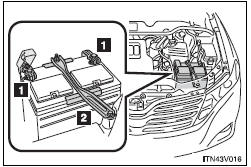Toyota Venza: Battery
- Battery exterior
Make sure that the battery terminals are not corroded and that there are no loose connections, cracks, or loose clamps.

1. Terminals
2. Hold-down clamp
- Before recharging
When recharging, the battery produces hydrogen gas which is flammable and explosive. Therefore, before recharging:
• If recharging with the battery installed on the vehicle, be sure to disconnect the ground cable.
• Make sure the power switch on the charger is off when connecting and disconnecting the charger cables to the battery.
- After recharging the battery (vehicles with smart key system)
The engine may not start. Follow the procedure below to initialize the system.
 Depress the brake pedal with the
Depress the brake pedal with the
shift lever in “N”.
 Open and close any of the doors.
Open and close any of the doors.
 Restart the engine.
Restart the engine.
CAUTION
- Chemicals in the battery
A battery contains poisonous and corrosive sulfuric acid and may produce hydrogen gas which is flammable and explosive. To reduce the risk of death or serious injury, take the following precautions while working on or near battery:
• Do not cause sparks by touching the battery terminals with tools.
• Do not smoke or light a match near the battery.
• Avoid contact with eyes, skin and clothes.
• Never inhale or swallow electrolyte.
• Wear protective safety glasses when working near the battery.
• Keep children away from the battery.
CAUTION
- Where to safely charge the battery
Always charge the battery in an open area. Do not charge the battery in a garage or closed room where there is not sufficient ventilation.
- How to recharge the battery
Only perform a slow charge (5 A or less). The battery may explode if charged at
a quicker rate.
- Emergency measures regarding electrolyte
• If electrolyte gets in your eyes
Flush your eyes with clean water for at least 15 minutes and get immediate medical attention. If possible, continue to apply water with a sponge or cloth while traveling to the nearest medical facility.
• If electrolyte gets on your skin
Wash the affected area thoroughly. If you feel pain or a burning sensation, seek medical attention immediately.
• If electrolyte gets on your clothes
It can soak through clothing on to your skin. Immediately take off the clothing and follow the procedure above if necessary.
• If you accidentally swallow electrolyte
Drink a large quantity of water or milk. Get emergency medical attention immediately.
NOTICE
- When recharging the battery
Never recharge the battery while the engine is running. Also, be sure all accessories are turned off.
 Brake fluid
Brake fluid
- Checking fluid level
The brake fluid level should be between the “MAX” and “MIN” lines on the tank.
Make sure to check the fluid type and prepare the necessary items.
- Addi ...
 Washer fluid
Washer fluid
If any washer does not work or the low windshield washer fluid level warning
light comes on, the washer tank may be empty. Add washer fluid.
CAUTION
- When refilling the washer fluid
Do n ...
Other materials about Toyota Venza:
Clock Display Circuit
DESCRIPTION
The accessory meter assembly uses this circuit to communicate with the combination
meter assembly via the direct line. The accessory meter assembly uses this circuit
to receive the drive monitor switch signals from the combination meter assemb ...
IG Power Source Circuit
DESCRIPTION
The main power source is supplied to the A/C amplifier when the ignition switch
is ON.
The power source is used for operating the A/C amplifier and servo motor, etc.
WIRING DIAGRAM
CAUTION / NOTICE / HINT
NOTICE:
Inspect the fuses for cir ...
Front Door Speaker
Components
COMPONENTS
ILLUSTRATION
Removal
REMOVAL
PROCEDURE
1. DISCONNECT CABLE FROM NEGATIVE BATTERY TERMINAL
CAUTION:
Wait at least 90 seconds after disconnecting the cable from the negative (-)
battery terminal to disable the SRS system (Se ...
0.1326
